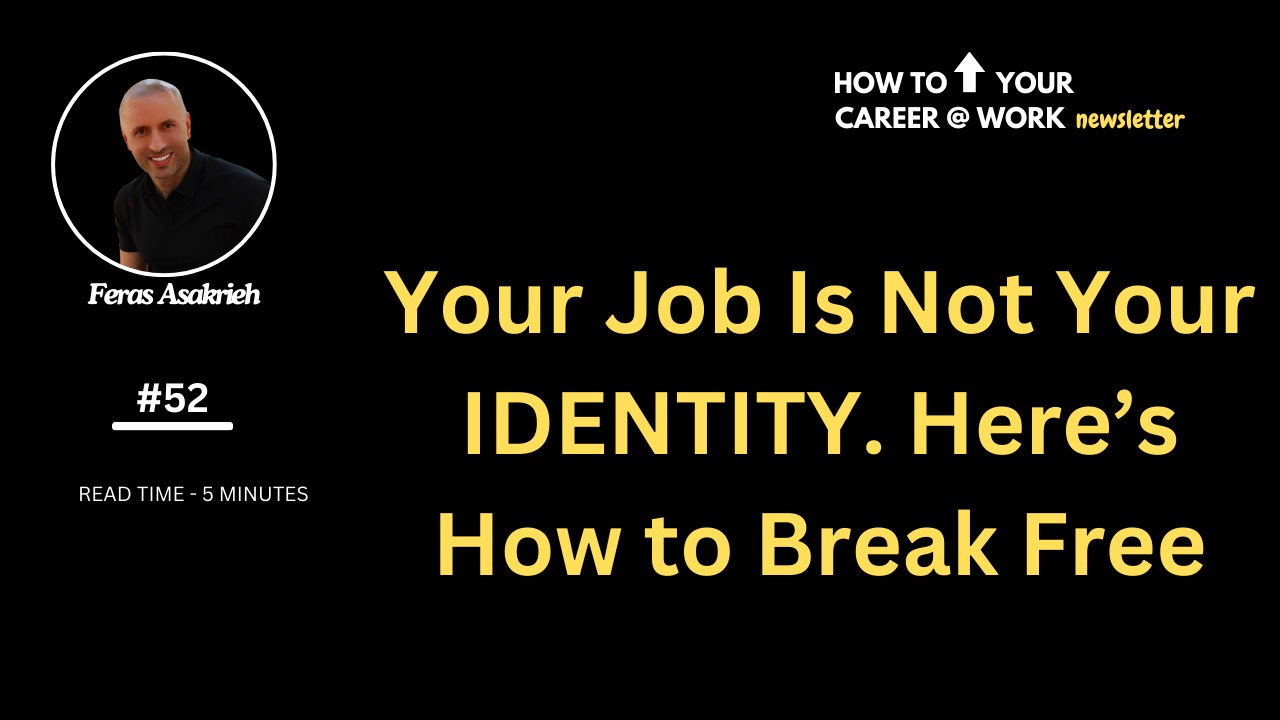
Your Job Is Not Your IDENTITY. Here’s How to Break Free
READING TIME - 5 MINUTES
Let’s be honest:
many people tie their identity to their job title.
We walk around introducing ourselves by what we do for a living—VP at work, manager at work, director at work.
But here’s the reality:
your job does not define who you are.
What happens when you lose that title?
Do you still know who you are?
Do you carry your job identity home with you, or do your family and friends see the real you, beyond the work?
Most people make the mistake of identifying too closely with their job, and here’s why that’s dangerous:
1. You base your value on your title.
You tie your worth to what you do at work instead of who you are as a person.
2. You miss out on the other parts of life.
When your job becomes your identity, you stop focusing on the other things that truly matter.
3. You risk losing yourself when your job changes.
The day you lose your job, if that’s your sole identity, you feel like you’ve lost everything.
This is a dangerous place to be—people keep you around for what you bring to the table, not just your title.
The value you create, the connections you make, and the relationships you build matter more than any job title ever could.
I learned this the hard way.
At one point, I made the mistake of bringing my title home.
I quickly realized that my family and friends didn’t care about my job title.
They cared about me, who I was as a person, and how I showed up in their lives.
Why Making Your Job Your Identity Can Ruin Your Life
When your identity is tied solely to your job, you risk losing everything when that job disappears.
But here’s the thing:
you don’t have to be defined by your career.
You have the power to separate who you are from what you do.
I made several changes in my life to set clearer boundaries between work and self-identity.
Here’s how I did it:
1) I Identified My Priorities and Ranked Them
It’s not just about work.
My priorities are: God, health, family, and then work.
If I’m not healthy and spiritually grounded, I can’t support my family.
Once I realized that, everything fell into place.
Money and work just add to the foundation that is already solid.
2) I Created Multiple Workstreams—So I Didn’t Rely ONLY on My Day Job
I opened side hustles, invested, and created passive income streams so that I didn’t have to rely solely on my day job.
Don’t get me wrong, I still need my job—but now I can live without it.
Diversifying my income was a game changer.
3) I Built a Network of People Where We Don’t Talk About Work
Instead of only focusing on career and job talk, I built relationships with people where we talk about investment, health, sports, relationships, and life in general.
It’s refreshing to have connections outside the work bubble.
4) I Stopped Leading Conversations with “What Do You Do?”
I chose to start conversations with other topics.
Instead of introducing myself with my job title, I let my personality and interests speak for themselves.
This reminder helps me stay focused on what truly matters.
5) I Built a Personal Brand That’s Separate from My Job
People know me for my family, my social media presence, and my network.
Very few people know what I do at work unless they’re very close to me.
My identity is rooted in who I am as a person—not my career.
Last word...
Getting this right is everything.
So many people, when they retire, get laid off, or lose their job, feel like they’ve lost everything.
But that’s just not true.
If your job is your only identity, you’re setting yourself up for disappointment.
Take time this week to think about your own identity.
Start working on building a life that’s bigger than your job title.
Your job today has an expiration date.
Be ready for the future.